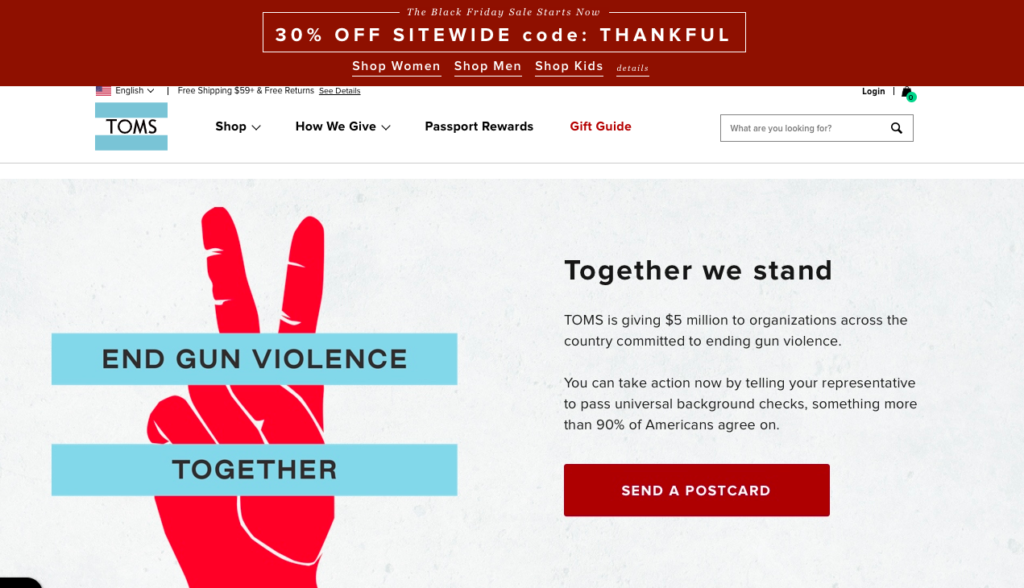It was slow in coming, the CEO response to anti-abortion laws across Alabama, Missouri, Kentucky, Georgia, Indiana and others. But it came. Just not from the CEOs you might have expected to lead the charge for women’s rights and equality.
It came from the CEOs of B and C and D list companies, most of which you’ve never heard of and won’t remember. CEO activism is trickling down from the most rich and powerful CEOs to a widening group that feels a responsibility to speak up for what it thinks is right.
Three weeks ago, seven women CEOs put a full page ad in the New York Times with a call to action: “For too long, corporate America has been largely silent on speaking up for sexual and reproductive health and rights. That must change. Today, we loudly and boldly declare that we will not be silent in defense of fundamental human rights and we challenge our peers in the business community to do the same. Now is the time to speak up.”
We’ve joined forces with @shethinx, @sustain, @thisisloom, @fur_you, @clarycollection, and @corawomen in collective action against the recent policies putting the lives of people who have a uterus at risk now more than ever. Thanks, @nytimes. #mybodymybusiness #stopthebans pic.twitter.com/cV0V5dPxFR
— Dame Products (@DameProducts) May 21, 2019
Last week, the CEO of SeekingArrangement, Brandon Wade, spoke up in his own way, committing to paying for travel and abortions for those who are unable to access abortions in their home state. He was moved to act upon learning that the law in Alabama would be hardest on the poorest and most vulnerable women.
On Monday, more than 180 CEOs, organized by Planned Parenthood and other rights organizations, signed an open letter in a full page ad in the New York Times entitled “Don’t Ban Equality: It’s time for companies to stand up for reproductive healthcare.”
The ad provides a business perspective on the abortion debate, framing it as a question of equality, which is critical for business success: “Restricting access to comprehensive reproductive care, including abortion, threatens the health, independence and economic stability of our employees and customers. Simply put, it goes against our values and is bad for business.”
Look I’m as middle of the road on this as you can be. I try to stay out of peoples business, which was so much easier when the argument was safe, legal and rare. This economic argument makes me sick to my stomach, especially from CEOs.
— James Gillette (@ShiningKharma) June 11, 2019
It might seem distasteful to frame this discussion as one about business. But the CEOs are speaking from a distinct and legitimate perspective. Every issue, from immigration, to education, to health care, to LGBT rights, has a business perspective that enriches discussion and debate. Will this argument change the average person’s mind on abortion? Probably not. But it should certainly give politicians, who are responsible for their constituents’ broad interests, pause.
The social media reaction has been predictable – employees applauding their CEOs for standing up for their rights, consumers threatening to boycott brands, deleting their Yelp app, and those that feel unelected CEOs should leave the matter to politicians.
To all the CEOs who signed that @nytimes ad/petition about abortion laws, you’re 180 people. The govt in those states serve millions. Millions who voted for the politicians that passed the laws that those politicians ran on adding. #YourMoneyIsntNeeded
— Pryboy (@pryboy) June 11, 2019
The glaring absence, of course, are the A-list CEOs. While the CEOs of Netflix and Disney have said they may stop filming in Georgia, one of the states with new legislation and a huge film industry, it’s clear they are being driven not by their own values but because their actors are flexing their own huge power. The five pages of names on a CEO letter that objected so quickly and in unison for LGBT rights in 2016 have been almost entirely absent from the current discussion. People have noticed.
Excuse me, @Starbucks? I’m sure I overlooked something, but I didn’t see you as having signed the #DontBanEquality ad….
Do you support gender equality and the #ERANow, @Starbucks?
It would pain me to boycott you, but I will. You’ll go in the same Boycott Bin as @Walmart.
— Leah Torres, MD (@LeahNTorres) June 10, 2019


